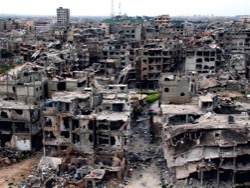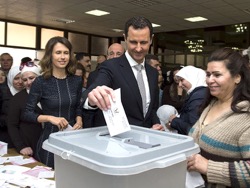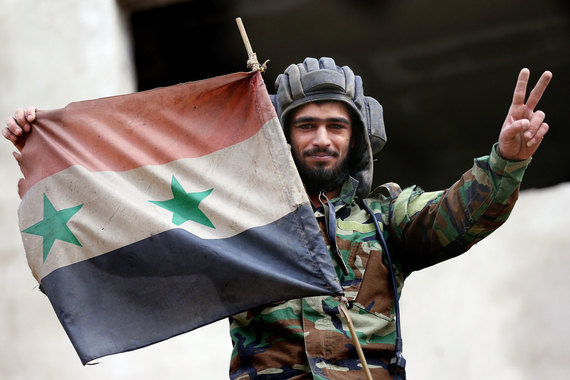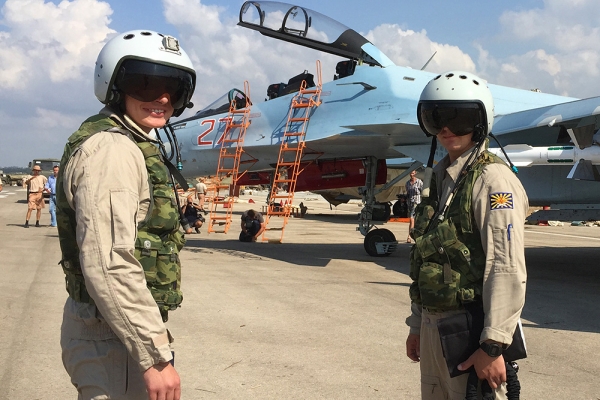
It’s been five years since Syria erupted into civil war. In 2011 the Arab spring swept across Tunisia, Egypt, Libya, Lebanon, Yemen, Algeria, Iraq, but in Syria the armed conflict continues to this day. Over the years, according to the UN, has killed 250 thousand people, 11 million were forced to flee their homes, 4.8 million of them went to other countries, mostly to Turkey, Lebanon and Jordan, hundreds of thousands chose to try his luck in Europe.
Taking advantage of the fighting between government forces and armed opposition throughout the country there are thousands of terrorist factions, the most dangerous of which have become “Islamic state” and “dzhebhat EN-Nusra”. The influence of ISIS is not limited to Syria, its fighters are also in Iraq and Libya, they are behind the organization of a series of terrorist attacks in Paris in November 2015.
Understanding the danger of the situation came to Western leaders belatedly, but nevertheless they decided not to introduce troops into the chaos-ridden country, limiting the air strikes. Their performance everyone appreciates in their own way, but before the operation of the Russian space forces, the only country invited by Damascus, it is difficult to see any changes in the situation in Syria. Only after the intervention of the Russian military of the Syrian government forces managed to retake territory from ISIS.
It showed that Bashar Assad remains the force that can handle the terrorists, but in the West it did not affect their position that the Syrian President is a dictator and “must go”. His fate has become a major stumbling block in the inter-Syrian peace talks, the third attempt which is being held now in Geneva.
The opposition, represented by the Higher Committee on negotiations (WCP), requires the immediate departure of Assad. The government delegation, of course, opposes. Interestingly, to directly dialogue the parties do not want to, preferring to communicate through an intermediary – the special UN envoy for Syria Staffan de Mistura.
The main achievement of the international community – in force since 27 February, the truce agreed by Moscow and Washington and supported by leading international and regional players. It is allowed to start the next round of negotiations. Of course, it’s sometimes broken, but these are isolated cases, observers noted a serious decline in tension. However, this does not affect the fight against terrorist groups, led by both government forces and the opposition.
The current situation has allowed Russian President Vladimir Putin to adopt a decision to withdraw the main part of the Russian military forces from Syria. It was a big surprise for the West. Its leaders are afraid to give comments, note that numerous media outlets.
American “Politico” writes that “the announcement by the Russian leader on the withdrawal of armed forces from Syria caught Washington by surprise”, there was concern that “Putin plays with Obama.” “American analysts and intelligence officials are not expected Moscow to take such decisions,” the newspaper said.
“Financial times” emphasizes that “strikes the HQs of the Russian Federation helped the Syrian government to turn the tide of war and return a significant amount of territory, Putin’s military intervention was an opportunity to reaffirm Russia’s status as a power entitled to vote in world Affairs far beyond its borders”. “Critics of President Barack Obama in Syria claim that the passivity of Washington has created a strategic vacuum that was filled by Russians,” adds the publication.
The “daily Telegraph” noted that “this decision could give new momentum to the UN organized peace talks in Geneva, which began against the background of unexpectedly successful truce declared last month”.
According to the times, “Putin acted thus in order not to let yourself be drawn into endless war, in the short term it could revive hopes for peace talks, or at least to save Russia from charges in the event of their failure.”
Bi-bi-si has noted that “Russia has achieved its main objectives”, increasing the position of Assad, whose troops occupied key strategic areas, and leaving him a key figure in negotiations about the future of Syria.
“Tagesspiegel” believes that “if Putin withdraws its troops, it means that the opponents of Assad is so weak that the regime in Damascus no longer needs Russia, and the Russian air strikes were effective not only against Islamists but also against the moderate opposition”.
Libération notes that “the first round of peace talks in Geneva ended in February, a failure due to the intensification of Russian air strikes that forced the opposition to abandon the talks.” “Now the ceasefire, initiated by Moscow and Washington, has been generally observed that creates completely new conditions for negotiations. And this may partly explain the withdrawal of Russian troops, declared on the beginning of negotiations. But even if there will be a conclusion, Russia will have to complement it with the intensification of diplomatic efforts, the more that President Putin will be able to present all this as an important concession on his part. Thus, Putin has used the war card first, then card reconciliation, thus showing that he is more than Washington, is a leader in this party,” continues the publication.








